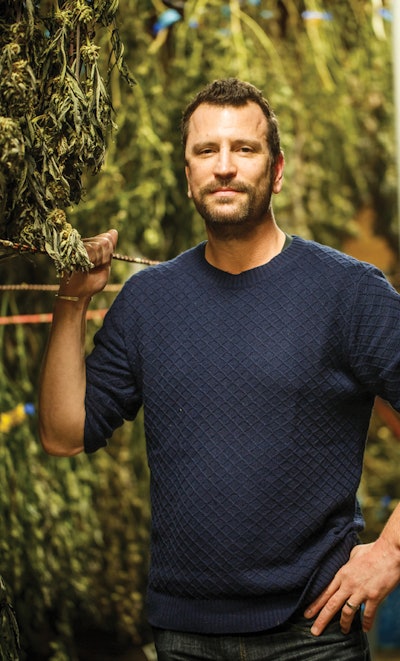
Matthew Huron never went to business school. He never ran a company. He never worked as an executive. But he’s now the owner and CEO of Good Chemistry, one of the most successful cannabis producers and retailers in Colorado. While much of the cannabis market slowed near the end of 2015, Good Chemistry saw its sales go up. Between its two Colorado dispensary locations, one in Denver (which sells to the medical and recreational markets) and one in Aurora (which sells recreational only), the brand does more than 30,000 transactions each month. The two cultivation operations that Huron currently operates, which total more than 30,000 square feet, are not enough to answer the demand for his product, and a third facility that will add another 20,000 square feet of grow space is set to open in April.
Huron’s story is one, you might say, of a green thumb, a passion for helping people and a natural business sense. He’s the epitome of the successful cultivator, who is navigating the challenging cannabis marketplace, donning the Good Chemistry CEO boots to the tune of continual, but careful expansion, including across state lines.
“My father and his partner both had HIV, and they found therapeutic benefits from cannabis,” Huron says.
Cannabis increasingly was becoming an alternative treatment for HIV patients. So, in 2000, Huron and his father set up a small, non-profit medical marijuana co-op in San Francisco that served AIDS patients and the assisted-living and hospice facilities that treated them.
Over the next eight years, Huron learned to perfect his cultivation skills in the competitive California marijuana industry. Vertical integration (a system in which a person can have licenses to grow, process and sell cannabis) is not allowed in California. “What that creates,” he says, “is a highly competitive cultivation market where people really have to get good at what they're doing in order to get on the shelves of these stores.”
But when his father and his father’s partner both passed away in 2008, Huron was left to run a rather large co-op on his own.
“At that time, California was a very unregulated market, so it was pretty uneasy for me … especially with my father's death, and I was actually going to close the co-op down.”
As fate would have it, a friend invited Huron to check out what was happening with Colorado’s medical marijuana program. The well-regulated market opened Huron’s eyes to the possibilities in the Rocky Mountain State.
He closed his California co-op in 2009 and moved the business to Colorado, where he first started a dispensary called Wellspring Collective (of which he is still a 50-percent owner) and then quickly built his first cultivation facility under the Good Chemistry banner.
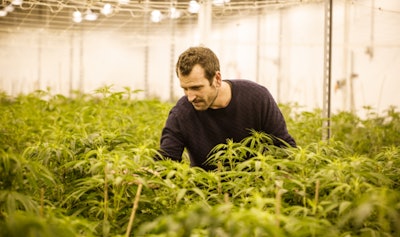
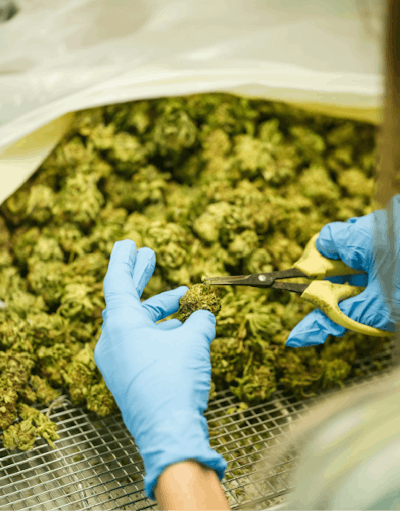
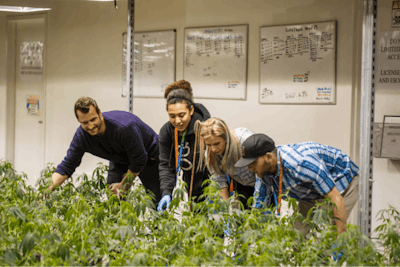
(Controlling) Rapid Expansion
When Good Chemistry first started its operations, it employed 10 people. “[It was me], and I had a few friends that started to work for me and that was it,” Huron says.
The UC Berkeley graduate is a long way from that small team of 10 he started with. Today, Good Chemistry employs more than 100, with that number expected to rise above 130 once the third cultivation center opens in April.
Huron also is looking to turn a five-acre plot of land he purchased in 2015 into a two-acre greenhouse (roughly 87,000 square feet). His rationale behind this decision is simple: There is no good reason for marijuana to be grown primarily indoors, he says. He laughingly adds that the reason most commercial cannabis producers today grow indoors is because “at one point this was illegal,” and the feeling that growing the plant should be hidden lingers on. Its federal status (illegal) also prompts some growers to maintain a low profile, which includes growing under cover. That, and state and municipal regulations that did or continue to limit cultivation to indoor grows.
Huron believes that as the cannabis industry continues to grow and the stigma surrounding it fades, moving to outdoor greenhouses is the next logical step. “I mean, the sun should be used, and we should really start thinking about optimizing our resources when growing marijuana,” he says.
“I think a lot of people that get attracted to this industry feel, to a certain extent, that [the process] is to put the plant in the ground, put some light over it, and you're going to grow a bunch of marijuana and make a bunch of money, and it’s just really not the case.” —Matthew Huron, CEO, Good Chemistry
After the success of the Good Chemistry dispensary in Denver, Huron opened the second store in Aurora last year.
This rapid expansion has not been without its challenges, however. While Huron comes from a cultivation background, and that aspect of the business comes more naturally to him, he had little experience when it came to the retail side of the industry. He says Good Chemistry took longer to perfect that part of the business and went through several managers before finally putting together a team he is happy with.
Multi-State Expansion
Once things were more settled in Colorado, Huron turned his eye to opportunities in other states and is taking advantage of a couple of them.
Good Chemistry is launching its first out-of-state cultivation facility this April in Reno, Nevada. Although nowhere near the size of the Colorado facilities, the Reno facility will allow Huron to test the viability of this different market.
“The [Nevada] market is not nearly as developed as Colorado,” he says. “So it's a much smaller facility. It's 11,000 square feet, but even within that facility, we decided just to build out a small portion of it and see how the market goes before we build a major facility.”
Good Chemistry is also in Phase 3 of the Massachusetts’s application process and is nearing provisional status. Huron hopes to see a dispensary up and running there within the next 12 months.
Amidst this explosive growth, Huron has taken measures to ensure that he doesn’t get in over his head. Being judicious about where he wants to go is one of the ways he has managed to control his company’s growth.
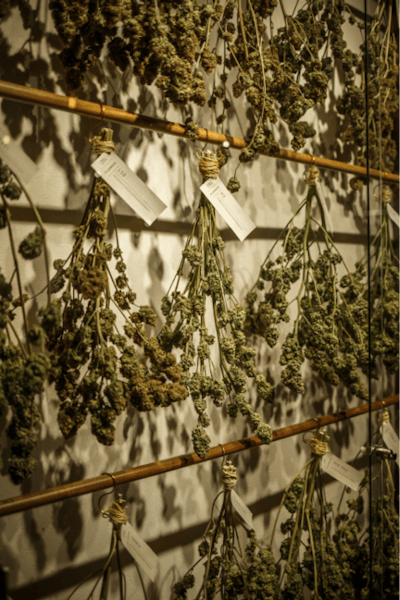

Compliance, Compliance, Compliance
According to Huron, the biggest hurdle remains the same one with which every other marijuana business has to contend: compliance.
Huron has worked with regulatory bodies such as the Marijuana Enforcement Division (MED) and the Department of Revenue in creating the legislative frameworks for marijuana businesses. But as with most things in life, you’re not going to get it right the first time.
“From a 50,000-foot view, [the rules] all make sense. It's when you actually try to put them into reality that there's a lot of hurdles.”
Again, many of the issues come from Colorado being the first test subject for truly legal cannabis in the country.
“Nobody's ever really envisioned how to track marijuana from seed to sale, how to test marijuana,” he says. “[Being in a regulated market] gives us meaningful protection from the Federal Government … but a lot of the rules and regs are not necessarily in line with doing business.”
Ultimately, he believes the MED wants cannabis businesses to do well and that those in the industry want to be compliant, “so it’s just a matter of figuring it all out.”
He is quick to add that Good Chemistry has a good compliance record, and the company has, in fact, gone the extra mile to make sure they remain compliant. The company recently hired a director of compliance whose job it is to make sure both dispensaries and the four (including Reno) cultivation facilities are doing everything right when it comes to meeting the standards set by the regulatory bodies.
Laura Davis, the newest member of Good Chemistry’s executive team, previously served five terms on the Colorado State Board of Health from 1995 to 2015, and brokered public policy and regulatory initiatives that benefited both businesses and the regulatory bodies. “She brings over 30 years of experience in regulatory compliance, public policy development and strategic planning to our leadership team,” said Huron in a statement.
“There's new rules, there's emergency rules, ... things that pop up all the time,” he says, adding that having over 100 employees to oversee makes it “a lot to digest.”
Quality Over Quantity
Good Chemistry is a self-funded company, one of the key factors that Huron says allows him to do business the way he wants: controlling growth, promoting quality over quantity and making sure nobody is cutting corners.
But having no outside investors or loans comes with its own set of challenges, especially when Good Chemistry has to go up against bigger competition.
“As you can imagine, expanding at the speed that we're expanding and trying to stay competitive with others that have a different financial makeup, it can be a big challenge,” he says.
From staffing to equipment and infrastructure, growing cannabis is a costly process.
“I think a lot of people that get attracted to this industry feel, to a certain extent, that [the process] is to put the plant in the ground, put some light over it, and you're going to grow a bunch of marijuana and make a bunch of money, and it's just really not the case,” he says.
“It's like any other agricultural crop. It takes technique, it takes experience, and it’s very expensive.”
So for companies that operate like Good Chemistry, using a small number of dispensaries to sell a high-quality product, resource allocation becomes crucial to success.
“We … are really highly focused on the nursery ... and having a select few dispensaries …,” he continues.
Making sure Good Chemistry is renowned for quality is also what makes it more attractive to a broader customer base. From cultivating some of Colorado’s top-ranked buds to innovating in the research and development areas of cannabis production, Huron wants to ensure that each customer has the right personal experience. “We spent a lot of time and energy creating an environment that is welcoming, ... more inviting to a broader demographic, and I think we're known for that as well,” he says.
The Aurora location, which celebrates its one-year anniversary April 9, is especially representative of that, and its design and atmosphere has been described as a cross between a Whole Foods and an Apple store.

Good Chemistry’s pioneering “category system,” which is designed to familiarize consumers with which strains can achieve which desired results, helps people thoughtfully navigate the diverse world of cannabis, across many levels of experience, as well as offers accessible information on the 60 strains Good Chemistry produces.
While many Denver dispensaries will try to entice customers with sales and promotions, Huron’s strategy is much more straightforward: Good Chemistry sells its flower at a flat rate of $30 for 1/8, no matter the strain.
Huron can afford to set his prices how he wants because all flower product sold at both Good Chemistry dispensaries are cultivated at his nurseries. And while Good Chemistry products can be found in other stores, no outside product apart from infused items are sold at Good Chemistry locations, ensuring that Huron knows exactly what he is selling, and customers know exactly what they are getting.
Despite the fact that it has been two years since the first licensed dispensary opened in Colorado, Huron says, “The customer is still getting educated. I think when the first stores opened people were just excited that it was legal. … I think now we're starting to see people are getting a little more educated. People are concerned about what they're putting in their bodies.”
While Huron believes that there will eventually be a “Budweiser of marijuana,” he also believes you will see the more discerning cannabis connoisseurs go to the “craft” section.
And that’s exactly where they’ll find Good Chemistry.
Brian MacIver is a recent graduate from the Medill School of Journalism. He writes about drug policy and trends, sports and anything else that catches his eye. You can find him on Twitter at @TheBrianMacIver, where he sometimes pokes fun at celebrities and politicians.
















